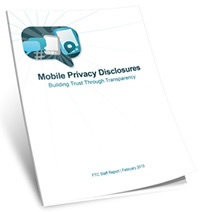The Federal Trade Commission, the nation’s chief privacy agency, issued a staff report recommending ways that key players in the rapidly expanding mobile marketplace can better inform consumers about their data practices.
The report makes recommendations for critical players in the mobile marketplace: mobile platforms (operating system providers, such as Amazon, Apple, BlackBerry, Google, and Microsoft), application (app) developers, advertising networks and analytics companies, and app developer trade associations. Most of the recommendations involve making sure that consumers get timely, easy-to-understand disclosures about what data they collect and how the data is used.
“The mobile world is expanding and innovating at breathtaking speed, allowing consumers to do things that would have been hard to imagine only a few years ago,” says FTC Chairman Jon Leibowitz. “These best practices will help to safeguard consumer privacy and build trust in the mobile marketplace, ensuring that the market can continue to thrive.”
The FTC staff report is based on the FTC’s enforcement and policy experience with mobile issues and a May 2012 FTC workshop, which brought together representatives from industry, trade associations, academia, and consumer privacy groups to explore privacy disclosures on mobile devices.
The report describes the explosive growth of mobile services: in the fourth quarter of 2012, consumers worldwide bought approximately 217 million smartphones. Smartphones and tablets offer a wide variety of benefits to consumers. They can be used to make audio and video phone calls, find the nearest coffee shop or gas station, check traffic, browse a digital library while waiting for an appointment, and connect with friends for spontaneous get-togethers.
At the same time, the report states that mobile technology raises unique privacy concerns. More than other types of technology, mobile devices are typically personal to an individual, almost always on, and with the user. This can facilitate unprecedented amounts of data collection. In addition, since a single mobile device can facilitate data collection and sharing among many entities, consumers may wonder where they should turn if they have questions about their privacy.
The report cites recent data showing that consumers increasingly are concerned about their privacy on mobile devices. For example, 57 percent of all app users have either uninstalled an app over concerns about having to share their personal information, or declined to install an app in the first place for similar reasons. Less than one-third of Americans feel they are in control of their personal information on their mobile devices.
Based on the Commission’s prior work in this area and information obtained through the panel discussions, written submissions, and the report offers several suggestions for the major participants in the mobile ecosystem as they work to improve mobile privacy disclosures. Read more at http://tinyurl.com/b8ztb7n .





